GALLUP NEWS SERVICE
PRINCETON, NJ -- The American public continues to be divided in its views about whether it was right or wrong for the Bush administration to wiretap conversations between U.S. citizens living in the United States and suspected terrorists living in other countries without previously acquiring a court order. A new CNN/USA Today/Gallup poll finds that a slim majority of Americans say the administration was wrong to authorize these wiretaps, and nearly 6 in 10 Americans say a special prosecutor should be appointed to investigate the matter. Republicans and Democrats sharply differ on this matter, with most Democrats critical of the practice and most Republicans supporting it.
Wiretapping Right or Wrong?
The poll, conducted Jan. 20-22, finds half of Americans (51%) believe the Bush administration was wrong in wiretapping terrorist-linked telephone conversations without first obtaining a court order, while 46% say it was right. The latest results show a slight shift in opinion from early January, when more respondents said the Bush administration was right (50%) than wrong (46%), though the change is within the margin of error for comparing samples between these two surveys.
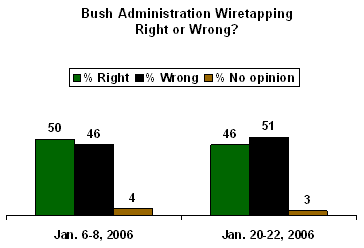
Public opinion about the way the Bush administration handled the wiretapping incidents is strongly linked to party affiliation. More than 8 in 10 Republicans say the administration was right to wiretap these conversations, while 10% say it was wrong. Among Democrats, only 18% say the administration was right, while 79% say it was wrong. Independents say it was wrong by a 61% to 38% margin.
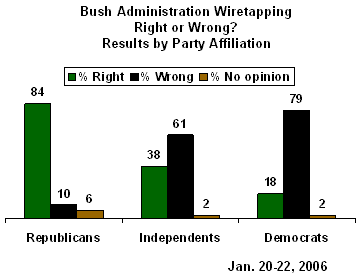
Special Prosecutor to Investigate Wiretapping?
Former Vice President Al Gore last week charged that the Bush administration broke the law in wiretapping these telephone conversations and urged that a special counsel be formed to investigate the domestic surveillance program. The current poll asked Americans about appointing a special prosecutor to investigate the wiretapping incidents and found that 58% of Americans would support the appointment of a special prosecutor, while 39% oppose this idea.
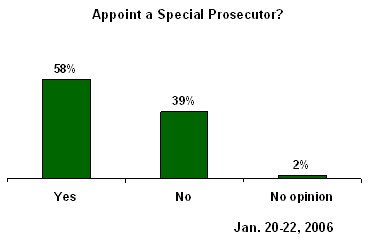
Results to this question are also sharply divided along partisan lines. Only 32% of Republicans say a special prosecutor should be appointed, compared with 61% of independents and 83% of Democrats.
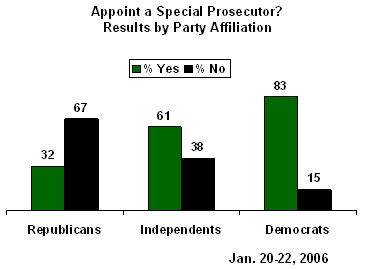
How Closely Are Americans Following This Story?
Nearly 7 in 10 Americans tell Gallup that they are following the story about the Bush administration wiretapping telephone conversations at least somewhat closely, including 31% who say they are following it very closely. Twenty-nine percent of respondents say they are not following the story closely. Earlier in the month, a slightly higher percentage of Americans, 75%, said they were following the story closely.
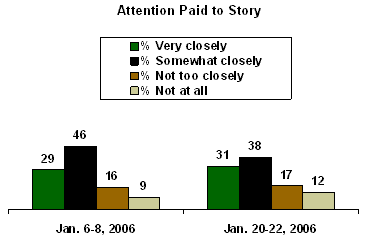
A review of the public reaction to other recent news stories shows that the wiretapping controversy is attaining considerable attention, although not as much as some high-profile news stories that have occurred in the past year or so. The percent following the Bush wiretapping story very or somewhat closely exceeds that seen for the recent Senate confirmation hearings for Supreme Court nominee Samuel Alito, as well as for the scandal involving lobbyist Jack Abramoff. Americans are not, however, paying as much attention to this story as they did to the aftermath of Hurricane Katrina or the tsunami that struck parts of Asia at the end of 2004.
Survey Methods
Results are based on telephone interviews with 1,006 national adults, aged 18 and older, conducted Jan. 20-22, 2006. For results based on the total sample of national adults, one can say with 95% confidence that the margin of sampling error is ±3 percentage points.
For results based on the 506 national adults in the Form A half-sample and 500 national adults in the Form B half-sample, the maximum margins of sampling error are ±5 percentage points.
In addition to sampling error, question wording and practical difficulties in conducting surveys can introduce error or bias into the findings of public opinion polls.
44. As you may know, the Bush administration has been wiretapping telephone conversations between U.S. citizens living in the United States and suspected terrorists living in other countries without getting a court order allowing it to do so. How closely have you been following the news about this -- very closely, somewhat closely, not too closely, or not at all?
|
|
Very |
Somewhat |
Not too |
Not |
No |
|
% |
% |
% |
% |
% |
|
|
2006 Jan 20-22 |
31 |
38 |
17 |
12 |
1 |
|
|
|
|
|
|
|
|
2006 Jan 6-8 |
29 |
46 |
16 |
9 |
* |
45. Do you think the Bush administration was right or wrong in wiretapping these conversations without obtaining a court order?
BASED ON 506 NATIONAL ADULTS IN FORM A
|
Right |
Wrong |
No |
|
|
% |
% |
% |
|
|
2006 Jan 20-22 ^ |
46 |
51 |
3 |
|
|
|
|
|
|
2006 Jan 6-8 |
50 |
46 |
4 |
|
^ Asked of a half sample |
|||
46. Do you think a special prosecutor should or should not be appointed to investigate this matter?
BASED ON 500 NATIONAL ADULTS IN FORM B
|
Yes, |
No, |
No |
|
|
Jan 20-22 ^ |
58% |
39% |
2% |
|
^ Asked of a half sample |
|||